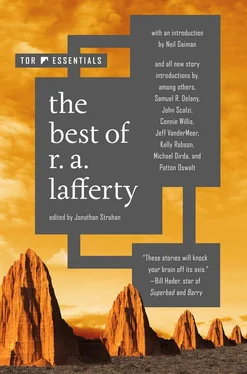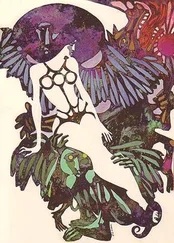“Yes, if you’re good enough. It will be the same if you make it the same.”
Icarus Riley made a world. He wasn’t very good at it and it wasn’t quite the same, but it did resemble the old world a little.
“I want to see if some things are still there,” Welkin clamored. “Bring it closer.”
“It’s unlikely your things are still there,” Joseph said, “Remember that billions of years may have passed.”
“The things will be there if I put them there,” Icarus insisted.
“And you cannot bring it closer since all distance is now infinite,” Karl maintained.
“At least I can focus it better,” Icarus insisted, and he did. The world appeared quite near.
“It remembers us like a puppy would,” Welkin said. “See, it jumps up at us.”
“It’s more like a lion leaping for a treed hunter just out of reach,” Icarus grudged. “But we are not treed.”
“It can’t ever reach us, and it wants to,” Welkin piqued. “Let’s reach down to it.”
(“And they inclined the heavens and went down.”)
A most peculiar thing happened to Ronald Kolibri as he touched Earth. He seemed to have a seizure. He went slack-faced, almost horror-faced, and he would not answer the others.
“What is it, Ronald?” Welkin begged in kindred anguish. “Oh, what is it? Somebody help him!”
Then Ronald Kolibri did an even more peculiar thing. He began to fold up and break up from the bottom. Bones slowly splintered and pierced out of him and his entrails gushed out. He compressed. He shattered. He splashed. Can a man splash?
The same sort of seizure overtook Karl Vlieger: the identical slack-face horror-face, the same folding up and breaking up from the bottom, the same hideous sequence.
And Joseph Alzarsi went into the same sundering state, baffled and breaking up.
“Icarus, what’s happened to them?” Welkin screamed. “What is the slow loud booming?”
“They’re dead. How could that be?” Icarus puzzled trembling. “Death is in time, and we are not.”
Icarus himself passed through time as he crashed earth, breaking up, spilling out more odiously than any of them.
And Welkin touched earth, crashed, then what? She heard her own slow loud booming as she hit.
(Another million years went by, or some weeks.)
A shaky old woman on crutches was going down the middle-of-the-night passages that are under the Rocks. She was too old a woman to be Welkin Alauda, but not too old for a Welkin who had lived millions of years outside of time.
She had not died. She was lighter than the others, and besides she had done it twice before unscathed. But that was before she had known fear.
Naturally they had told her that she would never walk again; and now most unnaturally she was walking with crutches. Drawn by the fungoid odor and the echoing dampness she went down in the total dark to where small things were growing with the wrong color white and were all of the wrong shape. She wanted one thing only, and she would die without it.
“Sky for salving the broken Crone! Sky for the weal of my hollow bone!” she crackled in an old-woman voice. But it was only her own voice that echoed back to her.
Should a Sky-Seller live forever?
Introduction by Gregory Feeley
“Cliffs That Laughed” appeared in the March 1969 issue of Magazine of Horror, surely one of Lafferty’s less likely markets (it was edited by Robert A. W. Lowndes, who had published some of Lafferty’s earliest stories and who doubtless knew enough to ask for more). It was reprinted in Lafferty’s second collection, 1972’s Strange Doings, but has scarcely been seen since. It certainly cannot be called a horror story, although what Freud called “the horror of incest” definitely plays a role. But what kind of story is it?
It’s a tale told in a bar, at least in part—but interleaved with another tale, told decades earlier to the same narrator, by a Malay storyteller he met while stationed in Indonesia, who gained new inspiration when he gained access to American comic books. The storyteller’s tale, which begins with “flute notes ascending” and ends with “flute notes descending,” offers a pleasing sense of unity, but the other story, about three soldiers who disappeared on an Indonesian island in 1945, “keeps interposing itself” upon it. In the end, however, the two tales complete each other, forming a deeply bizarre saga that the narrator (his protestations notwithstanding) weaves into a third tale, the one we read.
The tale’s elements will be familiar for Lafferty fans: a bloodthirsty but colorful pirate; a willful young woman intent on withholding sexual favors; a fell scheme foiled by a clever trick. Neither will these readers be surprised by the rather idealized portrait of pirates, nor with what Andrew Ferguson calls Lafferty’s “lurid depictions of death and dismemberment.” What does startle us is that the trick turns on the incest taboo, something Lafferty never otherwise wrote about. The brutal but poetic Willy Jones finally wins over Margaret, daughter of a man he murdered, and succeeds in consummating his love, but when he disregards her warning not to resume pirating, she exacts a grotesque vengeance upon his return to their sinister island, which forever frustrates his desire to “board” his wife lest he unwittingly commit the abomination of incest. Since her trick requires both Margaret and her nubile—indeed indistinguishable—daughter (born and bred during Willy’s twenty-year absence) to be at once dead and alive, the grotesque family romance seethes with the Freudian unheimlich or uncanny, and leads in time to father, mother, and daughter banding perversely together to attract other men to the island and then slaughter them as they “frolicked” with the two beautiful women.
This tangle of rage and baffled lust—the impulse to incest deflected into murderous resolve—gets its sequel in the tale told in the bar, by an American soldier who alone escaped from Willy Jones Island in 1945 and now, after twenty years’ journeying home, wishes for nothing but to go back again. A Malay folk tale updated by Wonder Woman (complete with numerous elements common to incest myths, such as identical mother and daughter and a questing figure who was declared dead yet is still alive) turns into the evocation of a composite Belle Dame Sans Merci, who leaves the men she encounters wracked by sexual enthrallment and desolation. It is a strange short story even for Lafferty, and this is without mentioning the “golems” (who are clearly something else) or the uncanny intermediate condition that haunts the text, such as the “middle state” between life and death (which mother and daughter now inhabit) or the “middle land” that the soldier traverses beneath the earth.
And what does the title signify? There are no cliffs in the story. The soldier now returning to his death remembers the two women as being “like volcanoes” and declares that “we climbed them like mountains. Man, the uplift on them! The shoulders were cliffs that laughed. The swaying—”
It’s an odd image (it does not sound like shoulders that he is praising) and recalls a short story Lafferty published a year later, “The Cliff Climbers,” in which the eponymous cliff—which the narrator tells us at the outset is actually “a spire”—clearly (like the “up-thrust” or “rock chimney” in “Continued on Next Rock,” also published in 1970) stands as a synecdoche, too blatant for readers to overlook, for a centuries-long male desire, one that (as in “Continued on Next Rock”) proves destructive to both pursuer and pursued.
Lafferty’s use of “cliff” as an image of displaced sexuality remains finally mysterious, as do his reasons for offering a different version of the three soldiers’ disappearance in his 1971 novel The Devil is Dead. “There is only one story in the world,” the storyteller reminds us, and the version proffered in “Cliffs That Laughed” gives us myth, humor, and virtuosity. For utter clarity, you need look to another writer.
Читать дальше




![Рафаэль Лафферти - Дни, полные любви и смерти. Лучшее [сборник litres]](/books/385123/rafael-lafferti-dni-polnye-lyubvi-i-smerti-luchshe-thumb.webp)
![Рафаэль Лафферти - Лучшее [Сборник фантастических рассказов]](/books/401500/rafael-lafferti-luchshee-sbornik-fantasticheskih-ra-thumb.webp)